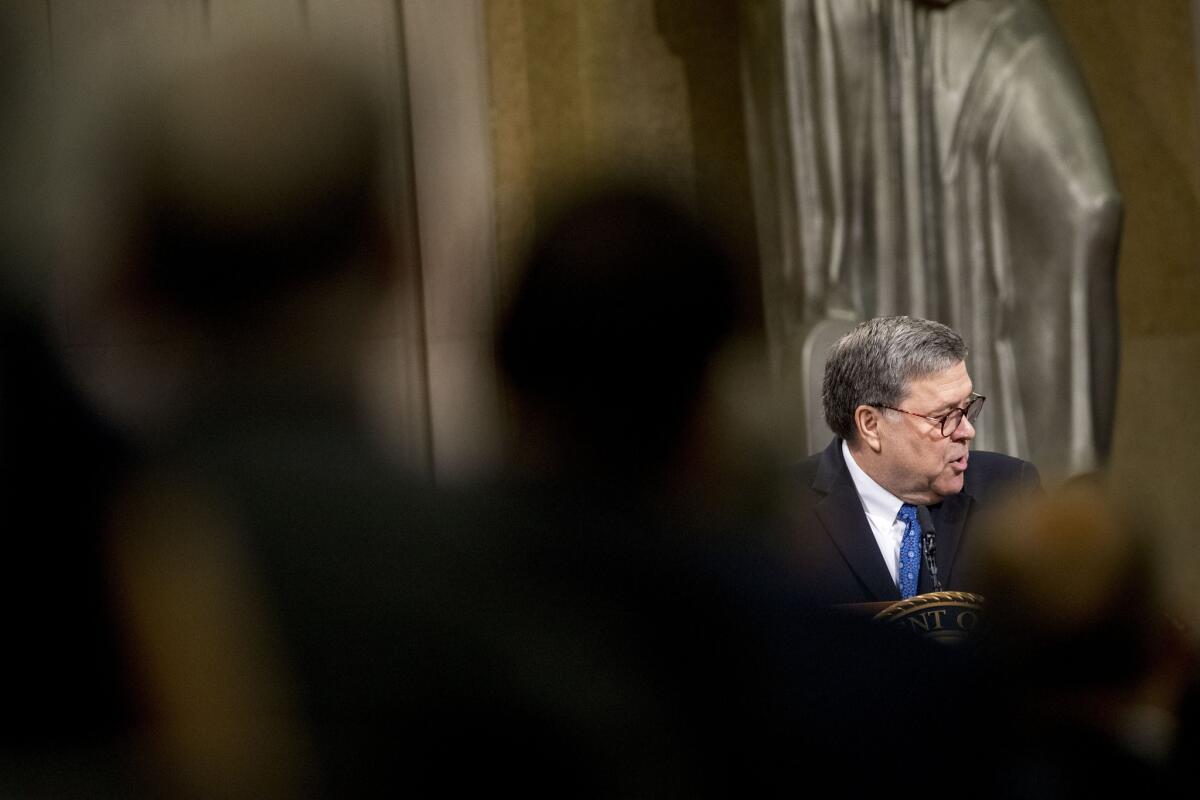Column: Bill Barr has more ways to politicize the Department of Justice

- Share via
In the friendly confines of a Fox News interview on Sunday, Atty. Gen. William Barr laid out his chief concerns and enforcement priorities heading into the election.
As two career Department of Justice prosecutors detailed in congressional hearings Wednesday, Barr has allowed improper considerations — most offensively, the president’s political interests — to drive enforcement considerations. The bill of particulars against him includes misrepresenting the Mueller report, seeking a lesser sentence for Roger Stone, trying to dismiss the proved case against Michael Flynn and firing U.S. Attorney Geoffrey Berman, who was investigating Trump dealings in New York. What Barr made clear on Sunday was his willingness to use the Department of Justice to interfere in the presidential election on President Trump’s side, politicizing voting rights and the marketplace of ideas on the internet.
Picking up on Trump’s bitter but unsubstantiated criticism of Facebook, Twitter and other internet companies, Barr is determined to rattle the DOJ’s antitrust saber at Silicon Valley, and first up is the advertising and search giant Google. According to various news reports, the department is already drafting an antitrust complaint against Google and interviewing lawyers to prosecute the case. That’s after only a year of investigation, which is actually warp speed in terms of bringing an antitrust complaint.
Yet it’s unclear what theory the department would pursue. The Federal Trade Commission, which also has antitrust jurisdiction, looked closely at possible antitrust charges against Google in 2013 and concluded there was no basis to bring a case.
That’s not to say that a company the size of Google could not correctly be the subject of an antitrust case. However, the department would need to prove the company’s market power is monopolistic and that it has an adverse effect on consumers, such as exorbitant advertising fees or a reduction in the quality of information available to consumers. As to the latter, it’s hard to see how a censorship case can be made given the innumerable sources of information of all stripes that Google presents.
But the Fox interview provided a strong clue explaining the attorney general’s fixation on Silicon Valley. Powerful internet companies, said Barr, are “only presenting one viewpoint, and they can push the public in a particular direction very quickly.” Removing any doubt about which direction he had in mind, Barr endorsed an assertion made by Rep. Devin Nunes (R-Tulare): “Conservatives are being censored.
“One way that this can be addressed,” Barr went on, “is through the antitrust laws and challenging companies that engage in monopolistic practices.” In other words, the department’s antitrust prosecutorial powers can bring Google, et al., to heel.
The Barr-Nunes premise is fanciful. As the Economist found in two painstaking statistical reviews of Google searches, there’s no credible evidence of censorship, only stray anecdotes and phony “aha” moments from Fox commentators. Moreover, there clearly is robust debate on the web.
Beyond the problem of proving adverse effects, the blunderbuss of an antitrust prosecution is an inapt remedy for perceived bias. Trying to break up Google, Facebook or Twitter, in fact, hobbles the prosecution because it could give rise to a 1st Amendment defense. These internet giants could argue that if it were somehow proven that they had created politically biased algorithms, it would violate the Constitution for the department to prosecute them on the basis of their anti-conservative viewpoint.
Barr’s second Trumpian target for the DOJ in coming months is even more ominous than clamping down on digital media: a threat to “tighten up” mail-in voting. Voting by mail, the attorney general said on Fox, “absolutely opens the floodgates to fraud. Those things are delivered into mailboxes. They can be taken out. There’s questions about whether or not it even denies a secret ballot.”
More fantasy. Republican and Democratic officials in about two-thirds of the states have made it easy for voters to send in ballots by mail. Safeguards such as checking voter signatures against registration rolls are already in place for absentee ballots. Oregon is one of five states that holds its elections only by mail. In nearly 20 years, it has found only two cases of mail-in ballot fraud that were strong enough to gain criminal convictions. Two out of more than 50 million ballots cast.
In 2020 in particular, mail-in voting is perhaps the single most important device for ameliorating the scandal of voters in poorer neighborhoods having to wait on line for hours while a few miles away, in affluent neighborhoods, mostly white voters breeze in and out. It’s a critical factor for ensuring safe voting during the COVID-19 pandemic.
Barr surely knows the real, wafer-slim record of voter fraud in this country. That he chooses to parrot myths about mail-in voting gives his game away. The GOP, which commands only a minority of American voters, seeks less, not more participation at the polls. Vote-by-mail efforts, as Trump told “Fox & Friends” not long ago, could mean “you’d never have a Republican elected in this country again.” Any moves by the Department of Justice to impede vote-by-mail should be given their proper label: voter suppression.
Barr has shown himself willing to use his vast powers in the service of the president’s political interests. So when he lays out an election-year agenda that plainly coincides with Republican Party interests, we should take him at his word: The DOJ is gearing up for a battle on behalf of Trump. The conduct will be dressed up in law enforcement garb, but the attorney general is being nakedly partisan.
@HarryLitman
More to Read
A cure for the common opinion
Get thought-provoking perspectives with our weekly newsletter.
You may occasionally receive promotional content from the Los Angeles Times.










